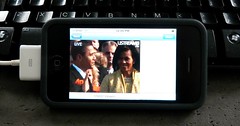
Today's big news for communications policy wonks is that apparently
Julius Genachowski will be tapped for FCC Chairman. The pick is Obama's first big imprint on the Commission. Although it is not a surprise, it is probably a smart move. Genachowski is an FCC veteran with deep knowledge of the technology industry (as General Counsel for
IAC and as a tech venture capitalist).
The news comes in the midst of
growing calls for FCC reform from folks like
Silicon Flatirons and
Public Knowledge. The theme is that the FCC needs to re-orient its rules and processes to make more sense in a converging, Internet-oriented communications landscape. I heartily agree.
Of course, this is not the first wave of calls for reform. Back in 2005 the DC think-tank Progress and Freedom Foundation spearheaded the "
Digital Age Communications Act," which argued that the powers of the Commission should be radically curtailed and that the Communications Act should be rewritten as antitrust policy. This amounted to abolishing most of the Commission's traditional powers. The bill never went anywhere.
Recently, Larry Lessig has argued that we should
do away with the FCC and replace it with a new entity. Lessig thinks that the Commission is rooted in outdated notions of monopoly rights and incumbent protection. He says, "You can't fix DNA. You have to bury it." His dream agency has two mandates: 1) agressively police monopoly and 2) ensure openness. Of course these two ideals are both hard to define and sometimes at odds. Nothing about creating a new agency will fundamentally change this reality. What's more, focusing heavily on market forces can often provide an excuse for ignoring the more socially motivated or
mundane-but-essential roles of communications policymakers. Market considerations are undeniably important, but proposals to reduce everything to antitrust lose sight of what is unique about communications.
The key to Lessig's approach appears to be "a strong agency head, and a staff absolutely barred from industry ties." I agree with his first prescription, and it's possible that Genachowski could be a step in the right direction. If recent reports are to be believed, he'll likely be an improvement over the outgoing Chairman. To begin with, the House released a blistering critique last month, titled "
Deception and Distrust: The Federal Communications Commission Under Chairman Kevin J. Martin." It cites FCC employee's references to being "Martinized" or "blue-boxed" -- their euphemisms for the Chairman's alleged habit of killing fact-based reports that didn't support his policy agenda. Then there was the recently released
Federal Human Capital Survey, which showed that an embarrasingly low number of FCC employees -- 38 percent -- felt that "My organization's leaders maintain high standards of honesty and integrity." I am less persuaded that the FCC staff should be "absolutely barred from industry ties." I'm not even sure what that means. Does it mean that they never can have worked in industry? Does it mean that after serving they never can move to industry? It seems like a recipe for inexperienced, disconnected bureaucrats.
One man with a passion for banishing uninformed bureaucrats was the late, great, and entirely deranged televangelist
Dr. Gene Scott. During his prolonged battle with the FCC, he would taunt the agency on-screen by representing it with a band of wind-up monkeys. He would often pick up his favorite, banging it on the head and exclaiming, "That's the only way to treat a bureaucrat!" I don't think that the appropriate solution to the shortcomings of the FCC is to beat the commissioners over the head with a stick, and I also don't think the solution is to abolish the agency altogether.
We don't have to "blow up" the FCC or reduce it to doing antitrust (we already have two agencies that are experts in that area). We could certainly use a re-write of the Communications Act that does away with the outdated and technologically siloed model of regulation in favor of
an approach more closely matched to reality. We could also use good leaders. I am hopeful that today's announcement sets the course of the agency in the right direction.






